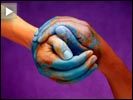
Guests
- Q'orianka KilcherHollywood actress and outspoken activist on indigenous issues.
Thousands of indigenous groups, grassroots activists and environmentalists began streaming into the World Peoples’ Summit on Climate Change and Rights of Mother Earth in Tiquipaya, Bolivia on Monday. Among them was the award-winning young Hollywood actress Q’orianka Kilcher. “I really believe and I love the saying that there comes a time when silence is betrayal,” Kilcher says. “As public figures and as celebrities, we have a responsibility to be able to help give voice to the voiceless.” [includes rush transcript]
Transcript
AMY GOODMAN: We’re broadcasting from Tiquipaya, just outside Cochabamba, in Bolivia. The World Peoples’ Summit on Climate Change and Rights of Mother Earth opened on Monday. Thousands of indigenous groups, grassroots activists and environmentalists began streaming into the conference here in Tiquipaya. People are coming from across Bolivia and around the world to attend.
Among them was the award-winning young Hollywood actress Q’orianka Kilcher. She played Pocahontas in the 2005 film The New World, for which she was short-listed for an Academy Award. She’s been an outspoken activist on environmental issues and won the Young Hollywood Green Award last year.
Democracy Now! producer Sharif Abdel Kouddous caught up with Q’orianka here at the conference last night.
Q’ORIANKA KILCHER: Hello. My name is Q’orianka Kilcher, and I am here at this amazing historical conference in Cochabamba, Bolivia. And I’m here to listen, to learn and also help amplify the amazing message that all of my indigenous brothers and sisters from around the world have to say. And I want to give a big shout out to the President, Evo Morales, for hosting this event, because it’s really important to have a platform like this, so that the indigenous leaders from all around the world’s voices can be heard and their message can be spread.
SHARIF ABDEL KOUDDOUS: And what’s your background?
Q’ORIANKA KILCHER: I am a descendant of the Quechua and Huachipaeri people of Peru and Swiss and Alaskan.
SHARIF ABDEL KOUDDOUS: And how has climate change affected those communities?
Q’ORIANKA KILCHER: It affects it all around the world. Sadly, I do a lot of work in Peru against, like, oil companies and stuff. And my film I did, The New World, it’s a love story, but more importantly it’s about the beginning of the colonizations of the Americas. But it continues today, and it’s now called globalization. And what multinational extractive companies are being allowed to do, like all around the world, is a complete disrespect to Mother Earth, as well as the people living on it.
And the message that is really important that I think all the leaders are giving and the message that I think is really important is that indigenous peoples have lived in harmony with Mother Earth, and their lifestyles are based on environmentally sustainable principles and practices without exploiting or destroying their children’s future. And I think it’s time that everyone realizes that some things don’t have a price, but they do have value, and what happens thousands of miles away will affect you and I, in some way. And as inhabitants of this beautiful planet, we all have one common need: a clean, healthy environment. And if it’s not clean and healthy, we’re not, either.
SHARIF ABDEL KOUDDOUS: And finally, as an actor, why do you feel it’s important to be here and speak out?
Q’ORIANKA KILCHER: That’s one thing I want to urge all the public figures, as well as celebrities, to really help be amplifiers for the indigenous leaders’ messages to be able to be spread. I think it’s really important. And me being a young indigenous actress in this new age of film and technology, we no longer have the excuse of not being able to know, because we have everything at the click of a mouse.
And I really believe and I love the saying that there comes a time when silence is betrayal. And I think, as public figures and as celebrities, we have a responsibility to be able to help give voice to the voiceless and amplify messages that need to be heard, because it’s important to all of us. And it’s important for all young people to also start getting involved in decision-making processes, because we’re inheriting whatever decisions are being made today. And so it’s time that we all stand up, unite, raise our voices, start asking questions, and make a change. Be a part of the climate changing shift in human consciousness and global warming of hearts.
AMY GOODMAN: Award-winning Hollywood producer Q’orianka Kilcher, speaking to Sharif Abdel Kouddous last night. Special thanks to Nicole Salazar.












Media Options